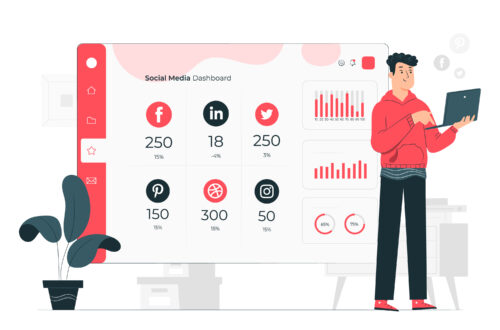
Losing the Grip: The Erosion of Authority in Digital Marketing Strategies
In the ever-evolving landscape of digital marketing, strategies that once promised soaring success are now grappling with a loss of authority. The dynamic nature of the online realm, coupled with changing consumer behaviors, has forced marketers to rethink their approaches. This article explores the shifting paradigms and the factors contributing to the diminishing authority of once-reliable digital marketing strategies.
The Rise and Fall of SEO Dominance
SEO’s Glory Days
Search Engine Optimization (SEO) was once hailed as the cornerstone of digital marketing success. Marketers meticulously crafted content, keywords, and backlinks to appease the algorithms of search engines. The higher your website ranked on Google, the more likely it was to attract organic traffic.
The Algorithmic Conundrum
However, as search engine algorithms became more sophisticated, relying solely on traditional SEO practices became less effective. Constant updates to algorithms by major search engines like Google left marketers struggling to keep up, rendering some SEO strategies obsolete overnight.
Shifting Focus to User Experience
The evolution of search engine algorithms also emphasized the importance of user experience. User-centric design and quality content are now pivotal in ranking high on search engine results pages. The shift from keyword stuffing to user engagement has left many traditional SEO practices losing their grip on authority.
Social Media Marketing: A Double-Edged Sword
The Golden Age of Social Media
Social media platforms emerged as powerful tools for digital marketers. The ability to connect with a global audience in real-time seemed like an unparalleled opportunity. Brands invested heavily in building a strong social media presence, expecting direct returns in the form of increased brand awareness and customer loyalty.

Saturation and Diminished Engagement
As social media became saturated with content, the once-effective strategy of posting frequently lost its impact. Algorithms on platforms like Facebook and Instagram changed, limiting the organic reach of posts. Marketers found themselves facing a paradox: the more they posted, the less engagement they received. The oversaturation of social media spaces has, to some extent, eroded the authority of this once-dominant strategy.
The Rise of Ad Fatigue
The reliance on social media advertising also contributed to its diminishing returns. Users, bombarded with a constant stream of sponsored content, developed ad fatigue. Click-through rates plummeted, and marketers were forced to explore alternative strategies to regain the attention of their target audience.
Email Marketing: From Inbox Triumph to Spam Folder Tragedy
The Inbox Triumph
Email marketing, once celebrated as a direct and personalized communication channel, enjoyed significant success. Brands leveraged email campaigns to engage with their audience, promote products, and drive conversions. The inbox was a sacred space where consumers willingly welcomed promotional content.
The Spam Folder Tragedy
However, as the volume of promotional emails skyrocketed, users became overwhelmed. The battle against spam intensified, and sophisticated filters started diverting marketing emails away from the coveted inbox. Consequently, the authority of email marketing suffered as messages that once had a direct line to consumers’ attention were now lost in the spam folder.

Shifting Towards Personalization
To counteract the decline, marketers are now focusing on personalization and providing valuable content in their emails. Tailoring messages to individual preferences has become crucial in avoiding the dreaded spam folder and regaining the trust and attention of recipients.
The Influencer Marketing Dilemma
The Rise of Influencers
Influencer marketing emerged as a game-changer, with social media influencers becoming powerful intermediaries between brands and consumers. The authentic and relatable nature of influencer endorsements promised unparalleled reach and credibility.
Oversaturation and Authenticity Concerns
However, the rise of influencer marketing led to oversaturation, diluting the impact of individual endorsements. Moreover, concerns regarding the authenticity of influencers and their partnerships with brands have cast a shadow over the once-effective strategy. As influencers become entangled in controversies and their recommendations lose credibility, the authority of influencer marketing wanes.
Micro-Influencers and Niche Strategies
To navigate this dilemma, marketers are now turning to micro-influencers and niche strategies. The focus is on authenticity and genuine connections, aiming to rebuild the trust that was lost in the era of macro-influencers and widespread skepticism.
The Emergence of New Frontiers
The Rise of Emerging Technologies
As traditional strategies lose their grip, marketers are turning to emerging technologies to explore new frontiers. Artificial Intelligence (AI), augmented reality, and virtual reality are reshaping the digital marketing landscape. Marketers are leveraging these technologies to create immersive and personalized experiences for their audience.
Data Privacy and Ethical Concerns
However, the adoption of new technologies comes with its own set of challenges. Data privacy concerns and ethical considerations surrounding AI and personalization strategies pose a threat to the authority of these evolving approaches. Striking the right balance between innovation and ethical considerations is crucial for the sustained success of these strategies.
Conclusion
In conclusion, the authority of once-dominant digital marketing strategies is eroding in the face of a rapidly evolving digital landscape. SEO, social media marketing, email marketing, and influencer marketing have all experienced shifts in effectiveness, prompting marketers to adapt and explore new avenues. As the industry continues to evolve, the key to success lies in staying agile, embracing innovation, and prioritizing authentic connections with the audience. The digital marketing landscape may be changing, but opportunities for success abound for those willing to navigate the shifting tides with creativity and adaptability.
Frequently Asked Questions (FAQ)
1. What is digital marketing?
Digital marketing refers to the use of digital channels, platforms, and technologies to promote products, services, or brands to a target audience. It encompasses a wide range of online activities, including search engine optimization (SEO), social media marketing, email marketing, and more.
2. Why is digital marketing important for businesses?
Digital marketing allows businesses to reach a global audience, increase brand visibility, and engage with potential customers in real-time. It provides a cost-effective way to promote products or services and enables precise targeting for better results.
3. What are the key components of a successful digital marketing strategy?
A successful digital marketing strategy often includes a combination of SEO, social media marketing, content marketing, email marketing, and paid advertising. The specific mix depends on the business goals, target audience, and industry.
4. How has SEO evolved over time?
SEO, or Search Engine Optimization, has evolved from keyword-centric practices to a more user-focused approach. Modern SEO involves creating high-quality, valuable content, optimizing for user experience, and staying updated with search engine algorithm changes.
5. Is social media marketing still effective?
While social media marketing remains effective, the landscape has become more competitive. Success now hinges on creating engaging content, building authentic connections with the audience, and adapting to platform algorithm changes.
6. What is the role of email marketing in a digital strategy?
Email marketing is a direct communication channel with the audience. It involves sending targeted messages to subscribers to promote products, share updates, and build customer relationships. Personalization and providing value are key to successful email campaigns.
7. Are influencers still impactful in digital marketing?
Influencer marketing can still be impactful, but challenges such as oversaturation and authenticity concerns have arisen. Marketers are now focusing on micro-influencers and niche strategies to enhance credibility and engagement.
8. How can businesses navigate data privacy concerns in digital marketing?
To navigate data privacy concerns, businesses should adhere to relevant regulations, such as GDPR, and prioritize transparent communication with users about data usage. Implementing secure data storage practices and obtaining explicit consent are essential steps.
9. What emerging technologies are shaping the future of digital marketing?
Emerging technologies like Artificial Intelligence (AI), augmented reality, and virtual reality are reshaping digital marketing. Marketers are leveraging these technologies to create personalized and immersive experiences for their audience.
10. How can businesses stay ahead in the ever-evolving digital marketing landscape?
Staying ahead requires a commitment to continuous learning, monitoring industry trends, and adapting strategies based on data and performance metrics. Embracing innovation, fostering creativity, and maintaining a customer-centric focus are key to sustained success in digital marketing.




